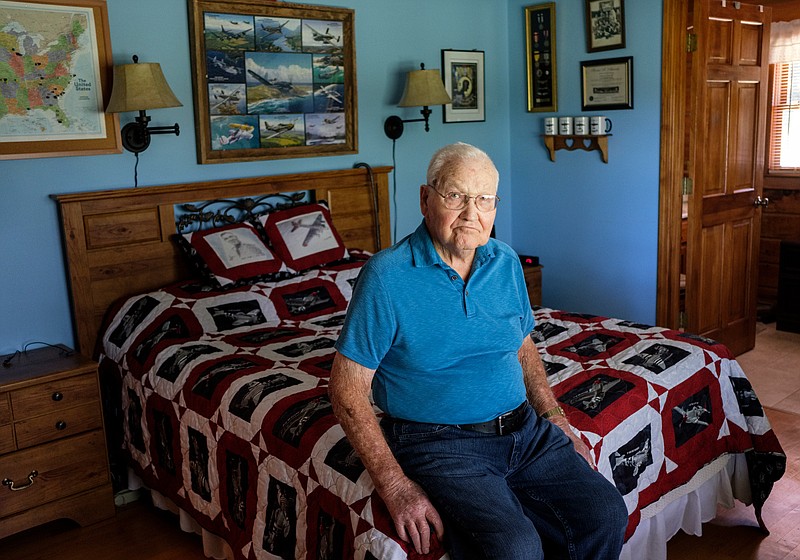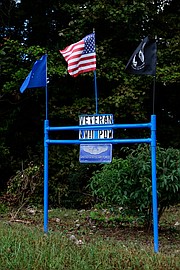 View our 21 Veteran Salute page
View our 21 Veteran Salute pageHorace Feezell remembers how it felt, flying at 30,000 feet and manning twin .50-caliber turret guns as tons of bombs rained down from his B-17 Flying Fortress onto the shattered landscape of Germany.
A technical sergeant and the plane's flight engineer, he remembers the heated flight suit and the insulated boots that kept him from freezing to death. He remembers the sight of a thousand aircraft flying across the North Sea and the Belgian countryside in a massive mission against a fuel refinery in Merseburg, about 120 miles southwest of Berlin.
"The world is out there but you're not part of it. You're just flying a mission," Feezell said.
That all changed in just moments on Nov. 30, 1944, on the way back from the bombing run that was Feezell's 18th mission. Heavy flak from anti-aircraft guns on the ground knocked out three of the B-17's four engines and set the aircraft ablaze. The nine men aboard parachuted to the ground and were taken prisoner by German soldiers.
For six months, Feezell, then 19, survived beatings, starvation, freezing cold, epidemic disease and three months of forced marches, staying just ahead of the Russian Army. He lost 50 pounds. His feet froze. And he still is terrified of German shepherd dogs, which remind him of the ones used as weapons against POWs who tried to fight back or escape.
BIO
Name: Horace E. FeezellAge: 94Branch of military: U.S. Army Air Corps/U.S. Air ForceYears of service: 1943-45 and 1950-53
"I don't know how I ever got this far," said Feezell, now 94 and living in rural McMinn County, Tennessee. "It was not all my own doings - my God Almighty was in charge."
The Kingston, Tennessee, native had graduated high school in 1942 and gone to work at Alcoa Aluminum making 36 cents an hour - "that was pretty good pay," he says - when he was drafted in 1943 into what was then the U.S. Army Air Corps.
He trained in Fort Oglethorpe, Georgia, and was sent to join the 390th Bomb Group, 370th Squadron of the Eighth Air Force in Framlingham, Suffolk, England.
"I was drafted to do a job and that's what we were doing," he said.
After their capture, the crew was split up by rank and sent to different prison camps. His was Stalag Luft IV, near the Baltic Sea. More than 8,000 prisoners, mostly air crew, lived in wooden barracks with no heat or showers. Freezell said the guards looted their Red Cross packages of food and cigarettes and the prisoners subsisted on potato soup and bread made with sawdust.
But Germany was running out of time, caught between U.S. and allied forces on the west and the Russian Army to the east. Between January and April 1945, the Nazis emptied their POW camps of about 30,000 prisoners to keep them out of the Russians' hands. Thousands died of starvation, disease and cold.
Feezell and his fellow prisoners were marched out of Stalag Luft IV on Feb. 6, 1945. He said they had no food or regular shelter, mostly sleeping on roadsides. They walked for three months, "mostly around in circles," until May 12.
The ragged, starved and sick POWs didn't know it but Germany had stopped fighting four days earlier.
That morning, the prisoners awoke to find the German guards and dogs gone and British soldiers coming to their rescue. Feezell soon was on a ship to the States and was sent to Miami for medical rehabilitation.
His service earned him five medals, including the Air Medal for combat missions and the Prisoner of War medal.
Feezell was recalled in 1950-53 for the Korean War but wasn't sent overseas. He had a career in commercial aviation, married and became a father, grandfather and great-grandfather. He farmed for a while in McMinn County and now lives in retirement with his second wife.
"Somewhere along the road I got old," he said. "That's all out of my system. I don't look back."
In these fractious times, does he believe the nation would respond to a grave threat the way it did in World War II?
"Just like they did in '43," Feezell said. "We're still Americans and we're going to do what we have to do."
Contact staff writer Judy Walton at jwalton@timesfreepress.com or 423-757-6416.

